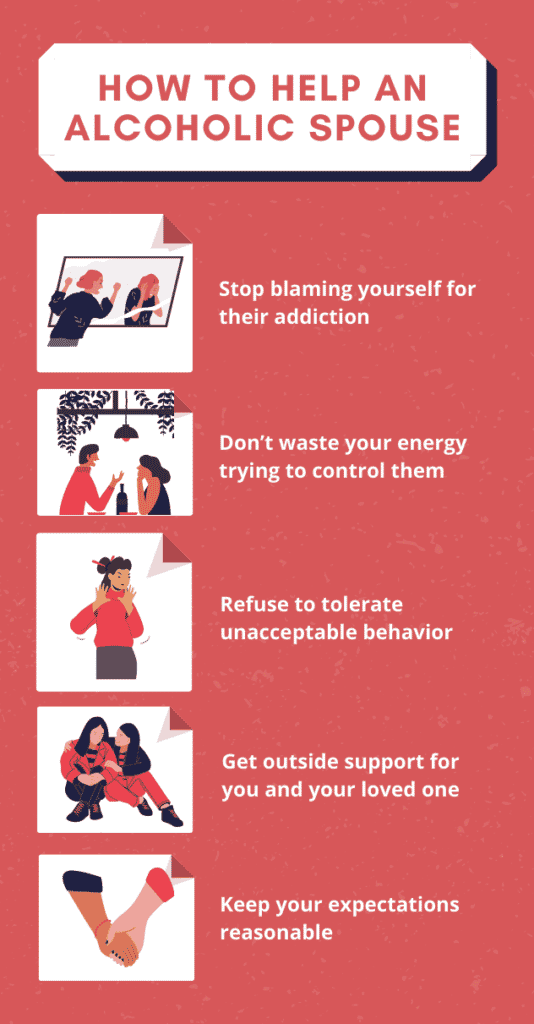If you’re asking yourself how to help an alcoholic spouse, you’re likely already exhausted from dealing with the challenges of living with a partner abusing alcohol.
You are probably tired of shouldering extra responsibilities, and you might be angry or depressed about your disordered domestic circumstances.
On top of these feelings and the resultant fatigue, you’re likely also concerned about the health, well-being, and future of all members of your household.
Learning how to get an alcoholic help is always valuable if someone you know is struggling with alcohol use disorder. When that person happens to be your partner, you should take action immediately.
The good news?
You can only change yourself and the way you interact with a partner abusing alcohol. There is little you can do to change addictive behavior without professional intervention.
Here’s what you can do to help an alcoholic husband or wife and help them learn how to quit drinking.
5 Ways to Help an Alcoholic Husband or Wife

1) Stop blaming yourself and stop viewing the situation personally
You may find your partner blames you, suggesting that you are the only reason they drink.
Reject this for the faulty reasoning it is. If your loved one is a full-blown alcoholic, they will drink regardless of what you do or don’t do.
Keep in mind that your loved one is behaving in this way due to changes to brain structure induced by alcohol abuse. Stop viewing the situation personally, and accept that your spouse may not be in control of their actions.
2) Don’t squander your time and energy trying to control your partner’s drinking
If you accept that your partner is unable to control their alcohol intake, stop trying to take control of it yourself. This is simply a waste of energy.
Beyond this, abruptly withdrawing from alcohol can be dangerous, possibly even deadly, so refrain from imploring your loved one to stop drinking suddenly and without medical assistance.
3) Refuse to tolerate unacceptable behavior
To avoid becoming trapped in an abusive relationship, stop tolerating any forms of unacceptable behavior. Being intoxicated is not an excuse for poor behavior, so don’t stand for it.
This is especially important if you have kids. Protect them at all costs from any negative behaviors coming from your spouse.
While it may seem tough to establish firm boundaries, you’ll be doing your partner a favor in the long run.
4) Get outside support for you and your loved one
Make sure you get outside help for yourself as well as your loved one.
Your partner may benefit from attending AA meetings, while you could find the peer support of Al-Anon invaluable. You’ll be surrounded by family members of alcoholics undergoing broadly similar experiences.
Therapy and couples therapy are also worth exploring if you need a helping hand.
5) Keep your expectations reasonable
Even if your loved one promises you faithfully they’ll stop drinking, don’t have too much faith in this promise. Alcoholism is a disease, and as such it needs to be treated like a disease.

Signs Your Partner Has an Alcohol Addiction
If you find yourself wondering how to help an alcoholic spouse, you first need to establish the nature of the problem you’re dealing with.
Many alcohol addictions start with people displaying patterns of excessive drinking. This abusive alcohol consumption can take either of these forms:
- Binge drinking: The CDC defines binge drinking as a man drinking at least 5 alcoholic beverages in 2 hours, or a woman drinking at least 4 alcoholic beverages in the same period. Getting drunk as quickly as possible is the typical goal underpinning binge drinking.
- Heavy drinking: If a man consumes more than 15 alcoholic drinks weekly, or a woman consumes more than 8 alcoholic drinks weekly, this is classified as heavy drinking.
You can use these benchmarks to assess how much your spouse is drinking. It is also worth paying attention to any patterns of binge drinking your partner displays.
People with alcohol use disorder – the clinical descriptor for alcoholism – often exhibit the following physical signs:
- Weight gain
- Weight loss
- Poor personal hygiene
- Shaking hands
- Reddened nose
- Dry, wrinkled skin
- Brittle nails
- Thin hair
- Yellowed skin or eyes
In addition to these physical signs, alcoholic loved ones are liable to display poor behaviors. Alcohol use disorder is characterized by a compulsive desire to consume alcohol, regardless of adverse outcomes. Your loved one may not even be aware they are drinking problematically.
Mental healthcare professionals diagnose alcohol use disorder based on responses to the criteria for AUD in DSM-5.
The criteria are as follows:
- Spending large amounts of time obtaining and drinking alcohol, as well as recovering from the effects of alcohol abuse.
- Experiencing problems at work, school, or home due to alcohol abuse.
- Trying and failing to stop drinking or to moderate alcohol consumption.
- Feeling strong cravings for alcohol as the effects wear off.
- Frequently drinking for longer than intended or drinking more than intended.
- Tolerance building, leading you to need more alcohol to get the same effects.
- Spending less time on day-to-day activities in favor of drinking alcohol.
- Engaging in risky behaviors when intoxicated.
- Drinking alcohol in spite of feeling anxious or depressed.
- Getting withdrawal symptoms as the effects of alcohol wear off.
- Continuing to drink alcohol despite these negative outcomes.
The presence of 2 or 3 symptoms is diagnosed as mild alcohol use disorder. Moderate alcohol use disorder involves 4 or 5 symptoms presenting, while the occurrence of 6 or more of these symptoms indicates severe alcohol use disorder.
How to Talk to Your Husband or Wife About Getting Help
The best approach for getting help for your alcoholic husband or wife is by talking to them in a gentle way about getting the help they need. If you’re looking for how to help an alcoholic spouse, there are simple ways to talk to them in a way that have the highest likelihood of being effective.
- Choose the Right Time and Place: Find a private and relaxed setting for your conversation at a time when your spouse is sober and in a peaceful mood.
- Express Concern and Love: Start by communicating your love and concern, letting your spouse know that you care about their safety and well-being.
- Use “I” Statements: State your concerns using “I” statements to avoid blame, focusing on your feelings and observations.
- Discuss Treatment Options: Share information about treatment options and express your willingness to support them in seeking help.
- Set Boundaries: Establish clear boundaries to protect yourself and your family, making it clear what behavior is unacceptable.
Be Patient and Revisit the Conversation: Understand that change takes time, and be patient as you continue to express your concern and love. Then, be prepared to revisit the conversation as needed to get help for alcoholic husband or wife.

Getting Help for an Alcoholic Spouse at Renaissance Recovery
As a progressive and relapsing disease, the sooner you figure out how to help an alcoholic spouse, the sooner both of your lives can return to normal.
Most mild and moderate alcohol use disorders respond favorably to outpatient rehab, so if you catch things before it’s too late, your loved one won’t need to pack their bags and head to a residential treatment facility.
While there is no cure for alcoholism, it can be effectively treated using a combination of medication-assisted treatment (MAT) and psychotherapy.
So, keep your expectations reasonable and help your partner to engage with an alcohol addiction treatment program here at our alcohol rehab in California or alternatively, at our Florida rehab. When your loved one is ready to make a change, call admissions at 844.912.2284.









